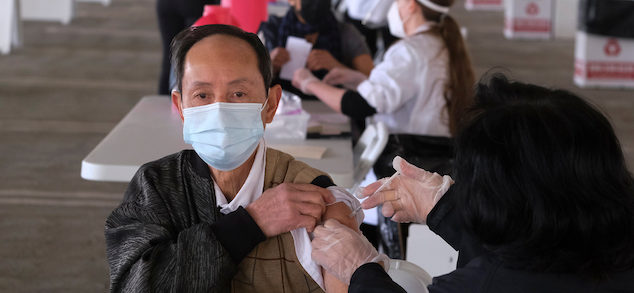Opinion
Vaccines’ swift approval helps vulnerable communities
 A man receives the Johnson and Johnson COVID-19 vaccine in Covina in March. (Photo: Ringo Chiu, via Shutterstock)
A man receives the Johnson and Johnson COVID-19 vaccine in Covina in March. (Photo: Ringo Chiu, via Shutterstock)Vaccines are one of the greatest public health tools for preventing the spread of infectious disease and death. Innovations in vaccines have helped all but eliminate significant threats from measles, polio, pertussis (whooping cough), influenza, and pneumococcal disease among those who are vaccinated.
The COVID-19 pandemic forced many Americans to delay or cancel health care visits, including for CDC recommended routine vaccines.
The result is a decline in immunization rates that threatens the health of Californians at the exact moment that students are returning to school and at the onset of the flu season.
The California Department of Public Health found that in April 2020, the number of vaccinations given to children up to 18 years old in California decreased by more than 40 percent compared to April 2019.
This is especially concerning now that California students have returned to schools and college students have returned to campus dormitories where diseases, such as meningitis, thrive.
Preventative measures such as social distancing and mask wearing helped protect against infectious disease in 2020, but as we have eased such restrictions, some experts are predicting a more serious flu season in 2021.
As flu and pneumonia season begins, it is critical that Californians – and particularly vulnerable populations such as children, adults over 65, and those living with certain medical conditions – follow the recommended vaccine schedule.
It is important to note that in addition to maintaining your recommended immunization schedule, there are other infectious diseases for which vaccines are available but not considered “routine” such as pneumococcal disease.
Currently, the available pneumococcal vaccines cover about 40 of the 90 different known strains of pneumococcal bacteria that cause pneumonia and other infections. Fortunately, this year, the U.S. Food and Drug Administration (FDA) approved two new additional vaccines that would help decrease the likelihood of severe illness and death.
Despite FDA approval, the broad availability of these vaccines depends on the CDC’s Advisory Committee on Immunization Practices, or ACIP, which reviews approved vaccines and makes recommendations about the most appropriate recipients and dosage. Many insurance plans provide coverage of vaccines based on ACIP recommendations. ACIP is scheduled to take up the new pneumococcal vaccines at a meeting in October, but that may be too late.
A swift recommendation from ACIP would help ensure the delivery of the new vaccines to the most vulnerable communities ahead of flu and pneumonia season and could potentially save lives.
For its part, the U.S. Congress can help ensure that seniors can afford their vaccinations.
Currently, seniors insured through Medicare Part D may pay higher out-of-pocket costs for vaccines than those insured through Medicare Part B or other insurance plans.
The U.S. House of Representatives is currently considering the Protecting Seniors Through Immunization Act, which would align Medicare Part D out-of-pocket costs for ACIP-recommended vaccines with Part B and other plans and ensure that high out-of-pocket costs aren’t preventing seniors from accessing critical vaccines.
As we continue the fight against COVID, it’s critical that we do not open the door to health threats from other vaccine-preventable illnesses. Everyone has a role to play. All Californians should have a conversation with their health care provider about the most appropriate vaccine that need to be taken and catch up on vaccines they may have missed due to COVID.
The federal advisors at the CDC ACIP should immediately take up and issue recommendations for new FDA-approved vaccines to ensure that they are broadly available before flu and pneumonia seasons.
California’s congressional delegation should support legislation to ensure that out-of-pocket costs are not a barrier to access for FDA-approved vaccines for California seniors.
—
Editor’s Note: Richard H. Dang, Pharm.D, is president of the California Pharmacists Association, which advocates for the importance of maintaining overall health, which includes receiving vaccinations.
| Lucila Garcia |
Want to see more stories like this? Sign up for The Roundup, the free daily newsletter about California politics from the editors of Capitol Weekly. Stay up to date on the news you need to know.
Sign up below, then look for a confirmation email in your inbox.

Leave a Reply